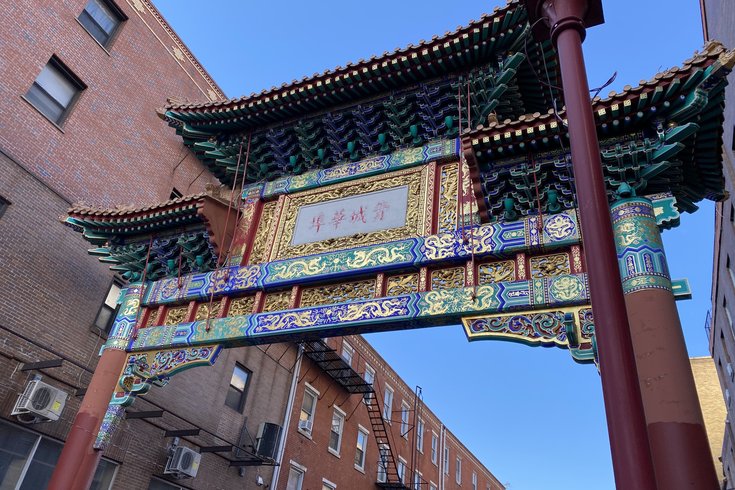
August 27, 2024
 Kristin Hunt/for PhillyVoice
Kristin Hunt/for PhillyVoice
The community impact study theorized that crossover appeal, overlap in business hours with peak pre- and post-game times and the dependence of customers on cars would make or break small businesses in Chinatown if the proposed 76ers arena on Market Street is built.
The city's community impact study on the proposed 76ers arena found that the project could increasingly displace low-income residents in Chinatown and negatively affect half of small businesses in the neighborhood.
According to the report, released Monday night, only about 1 in 5 small businesses in Chinatown, or 19.7%, stand to gain economically from the arena's construction. Another 30.1% would experience "varied" impacts, while 50.2% would see a negative net economic benefit.
The study also concluded that, while the project would not directly displace Chinatown residents by eliminating housing, "there is evidence for increased indirect displacement of small businesses and low- and fixed-income individuals through gentrification and loss of cultural identity in Chinatown if (it) were built."
The community impact study is one of several the city of Philadelphia commissioned in April 2023 to analyze the potential impacts of the proposed arena. While different consultants authored each of them, at least two were funded by the 76ers through a blind trust, which anti-arena activists have argued compromise the results. The studies' release this week follows months of delays.
Representatives for the 76 DevCo, a private investment group behind the project, and the Save Chinatown Coalition, the leading voice against the proposed arena, alluded to more complete reviews of the lengthy reports in the coming days. But 76 DevCo called the project "an appropriate use for Center City" that "will generate significant new jobs and tax revenue because Philadelphia can support two arenas."
The Rev. Greg Edwards, the executive director of POWER Interfaith and a member of the Save Chinatown Coalition, dismissed the studies as "window dressing to obscure" that "billionaire developers will benefit the most from 76 Place."
John Chin, executive director of the Philadelphia Chinatown Development Corp., was among a dozen community leaders who met with Mayor Cherelle Parker about the proposed 76ers area on Monday afternoon before the release of the study.
"What I said in the meeting with the mayor yesterday is that you can study any arena that’s been built — they don’t bring any organic benefits to neighborhoods," Chin said. "Any benefits have to be manufactured. Are those benefits that are created greater than the negative impacts that are created? Is it going to be a net positive for Chinatown, Washington Square West and Midtown Village? We don’t know that it will be."
RELATED: For the proposed 76ers arena to move forward, here are the bills that must pass
The community impact study looked at the ramifications for the neighborhoods within or directly outside the proposed arena site on Market Street, focusing primarily on Chinatown. It highlighted particular vulnerabilities among residents with limited English proficiency and businesses run by or catering to this clientele, who have historically relied on Chinatown for jobs and other resources.
To pinpoint potential impacts on local business, the study ran 309 small businesses in the heart of the neighborhood through a three-step analysis. First, it determined each company's crossover appeal to a wider audience, looking for English-only signage, social media presence, pickup and delivery options, and willingness to accept credit cards. Then it searched for overlap in business hours with peak pre- and post-76ers game times. Finally, it analyzed the car dependency of each company's customer base.
All 155 businesses lacking crossover appeal would suffer negative net economic benefits, the study concluded. Those with crossover appeal but no business hour overlap would see "varied" results. Only those with crossover appeal, business hour overlap and a client base with low to medium car dependency would benefit from the proposed arena.
Businesses that stood to gain from the project included hotels, bakeries, cafes and entertainment venues. Wholesalers, grocery stores, and financial and professional services would fare the worst under the study's analysis.
BJH Advisors and Sojourner Consulting, which authored the report, leaned on census data, property tax records and numerous interviews with community stakeholders. Most Chinatown business owners expressed negative views on the economic changes the arena would bring and felt the project would indirectly displace the neighborhood's current residents, workers and frequent visitors.
Their fears over the latter group were supported by street surveys. A majority of respondents (67%) said they would leave or stop coming to Chinatown if their "favorite business(es) shut down."
Though the arena proposal includes plans for 395 units of housing, focus groups also revealed significant concerns over low-income immigrant resident displacement. Demographic analysis reveals that Chinatown is a majority-renter neighborhood, making residents more vulnerable to displacement risks. Property tax increases since 2013 are a key pressure for residents, since the burden is usually passed onto tenants, as are property ownership changes in recent years.
In interviews, property owners and community leaders said intergenerational homeowners with deep community ties had historically been a great source of stability in Chinatown, since they were more likely to charge below-market rents. But they had observed at trend in "new, immigrant property owners who significantly raise rent for existing tenants and are more likely to renovate or redevelop the property in order to achieve their return on investment."
Whether or not the arena proposal proceeds, the study authors urged the city to prioritize affordable housing in Chinatown. But based on the report's findings, its construction could exacerbate the burdens of an already expensive housing market, especially for senior, low-income residents with limited English-speaking skills.
Senior Staff Writer Michael Tanenbaum contributed to this report.
Follow Kristin & PhillyVoice on Twitter: @kristin_hunt
| @thePhillyVoice
Like us on Facebook: PhillyVoice
Have a news tip? Let us know.